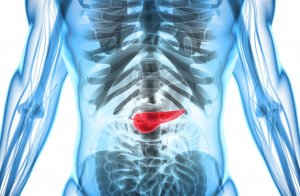Pancreatitis & Alcohol: Alcohol’s Effect on the Pancreas
What is the Pancreas?

The pancreas is a large organ located in the back of the abdomen, directly behind the stomach. It has several important functions, including both the release of digestive enzymes and exocrine hormones involved with blood sugar regulation.1
For its digestive role, a specialized group of cells (acinar cells) within the pancreas produce digestive enzymes that are secreted into the small intestine through the pancreatic ducts.2 These enzymes aid in the digestion of carbohydrates and proteins and help to break down fats.
To carry out its role in blood sugar regulation the pancreas produces two crucial hormones—insulin and glucagon. When blood sugar is too high, the pancreas secretes insulin into the bloodstream. When blood sugar levels are too low, the pancreas releases glucagon. A proper balance of blood sugar levels is crucial for the functions of key organs such as the brain, liver, and kidneys, and poorly regulated blood sugar can produce symptoms associated with diabetes.
What are the Effects of Alcohol on the Pancreas?
Heavy alcohol consumption can increase the risk of pancreatitis, a very painful and potentially fatal inflammation of the pancreas. The pancreatic acinar cells are thought to sustain damage from free radicals and other toxic byproducts of alcohol metabolism.4,5 Enzymes that are normally released into the digestive tract and activate when they enter the small intestine can become active in the pancreas, and as a result, the pancreas begins to “digest” itself.1 The damaged pancreatic tissue promotes inflammation, which leads to further damage of the pancreas.
If you believe you or someone you love may be struggling with an addiction to alcohol and are seeking help, call us today at . If you are interested in alcohol rehab and are unsure about costs, insurance may be able to cover a portion of your treatment. Fill in our online insurance verification tool below to find out.
Causes of Pancreatitis
Both acute and chronic pancreatitis can be caused by a number of factors.3 These include:3-5
- Gallstones, which are the number one cause of acute pancreatitis.
- Heavy alcohol consumption, which is the number two cause of acute pancreatitis, and the number one cause of chronic pancreatitis.
- Genetic diseases that affect the pancreas.
- Some types of injuries or infections caused by viruses or parasites.
- Certain medications.
- Pancreatic cancer.
Pancreatitis Risk Factors
There are many factors that can increase a person’s risk of developing pancreatitis. Risk factors for developing pancreatitis include:3-9
- Alcohol consumption. As alcohol is consumed, it is broken down into substances that are toxic to the pancreas. Over time, this can result in pancreatitis. Having two drinks daily can significantly increase the risk for developing pancreatitis, with the risk increasing as the number of drinks increases.
- Damage to the pancreas. Injury or infections affecting the pancreas can change how effectively it works, increasing the risk of developing pancreatitis.
- Gallbladder disease. Gallstones can create a blockage in the bile duct and pancreatic duct, which can lead to acute pancreatitis.
- Diabetes. Diabetes has been linked to a higher risk of developing acute pancreatitis. Someone with diabetes is about 30% more likely to develop acute pancreatitis than someone without diabetes.
- Medications. Taking estrogens or steroids can increase the risk of developing pancreatitis.
- Obesity. Studies have linked obesity to a much higher risk of developing pancreatitis, especially if it is combined with physical inactivity.
- Smoking. People who smoke cigarettes are much more likely to develop pancreatitis than non-smokers. Quitting smoking reduces the risk.
- High levels of triglycerides, parathyroid hormone, or calcium in the blood. These can all indicate imbalance of the endocrine system and can raise the likelihood of developing pancreatitis.
- Family history of pancreatitis. If you have family members who have had pancreatitis, you may be at greater risk of developing this condition yourself. Certain genetic conditions or mutations can play a role in increasing your risk of getting pancreatitis.
Types of Pancreatitis
Pancreatitis can present as either acute or chronic with varying degrees of severity at each type of presentation. Acute pancreatitis involves the sudden development of pancreatic inflammation, which can lead to symptoms that can last for several days before gradually resolving.10 Repeated acute pancreatitis episodes can lead to more persistent inflammatory changes throughout the pancreas and surrounding tissues, and it can make chronic pancreatitis more likely to develop.11
As the name implies, chronic pancreatitis features persistent symptoms and dysfunction related to irreversible pancreatic damage. With chronic pancreatitis, people may experience both exocrine and endocrine dysfunction. There may be inadequate pancreatic digestive enzyme secretion resulting in improper food digestion and progressive nutritional deficiencies. Insulin production may decline, leading to poor blood glucose management and diabetes. Additionally, the condition increases the risk of pancreatic cancer.10
Throughout the world, alcohol is a significant factor in the development of chronic pancreatitis. In the U.S. it is the most common causative factor for the condition, with nearly half of all cases of chronic pancreatitis estimated to involve alcohol consumption.12 Whether a person has acute or chronic pancreatitis, and regardless of the precise causes, healthcare professionals urge people to abstain from alcohol use as a means of managing these conditions.11
Symptoms of Pancreatitis (Acute and Chronic)
Pain in the upper abdomen that can spread to the back is the main symptom of both acute and chronic pancreatitis. The pain might be experienced in different ways. Individuals with acute pancreatitis might have symptoms that include:3
- Mild or severe abdominal pain.
- Swollen and tender abdomen.
- Back pain.
- Fever.
- Nausea or vomiting.
- Fast heart rate.
- Jaundice, or a yellowing of the skin or whites of the eyes.
Repeated cases of acute pancreatitis cause irreversible damage to the pancreas, leading to chronic pancreatitis and chronic abdominal pain. Ongoing alcoholism is the single most important risk factor for chronic pancreatitis. Findings from a large nationwide study showed that of all the deaths attributable to alcohol in 2016, 21.3% were due to digestive diseases (primarily pancreatitis and liver cirrhosis).13
Chronic pancreatitis is characterized by recurrent abdominal pain that is often accompanied by nausea and weight loss.3 As a result of sustained damage to the pancreas, the secretion of enzymes needed for digestion and fat absorption is decreased, causing loss of digestive function over time. There is also an increased risk for diabetes due to the destruction of β-cells, the unique cells in the pancreas that produce, store, and release insulin.14 Symptoms of chronic pancreatitis include:3
- Abdominal pain.
- Weight loss.
- Back pain.
- Nausea and vomiting.
- Pale colored, oily stools.
- Onset of diabetes.
Can You Drink Alcohol if You Have Pancreatitis?
Alcohol use is a direct cause of both acute and chronic pancreatitis. Continuing to drink can worsen these conditions and negatively impact their management, leading to increased frequency of acute pancreatitis episodes and a greater chance of developing chronic pancreatitis. Thus, many healthcare professionals soundly advise against alcohol consumption for anyone with pancreatitis.11
Alcohol Pancreatitis Treatment
If you experience an incident of acute alcohol-induced pancreatitis, it is recommended that you immediately stop alcohol consumption and consult your doctor to develop a diet plan that meets your health needs. This is your best chance to avoid future incidents of acute pancreatitis and lower your risk for chronic pancreatitis. If you develop chronic alcohol-induced pancreatitis it may be difficult, if not impossible, to reverse the damage to your pancreas. Some people with chronic pancreatitis require lifelong medication to aid in digestion and blood sugar regulation.
Regardless of whether you have acute or chronic pancreatitis, the single most important thing to do is to stop using alcohol as soon as possible. If you have an alcohol use disorder, characterized by an uncontrollable use of alcohol despite negative consequences, and find it difficult to stop drinking, you should seek treatment from a professional rehab center. Many people are helped in their recovery through either an outpatient or residential treatment program for alcohol use disorder.
Long-Term Impacts of Pancreatitis
In the long run, pancreatitis can have a major impact on various areas of your health. There can be complications associated with both acute and chronic pancreatitis, including scarring of the pancreatic tissue and irreversible damage, which can make it work less effectively, leading to other issues, including malnutrition, impaired glucose metabolism, and diabetes.4,15 Chronic pancreatitis-associated diabetes can be difficult to manage.10 People with pancreatitis have 8 times the risk for developing pancreatic cancer than people without pancreatitis.7
Other complications can include damage or blockage to the bile duct or pancreatic duct, infections, bleeding, or dehydration.14 Damage to the pancreas can change how well the body absorbs nutrients from food, which can lead to osteopenia (low bone mass) and osteoporosis (the disease that causes bones to become weak and brittle).12,15
Pancreatitis can lead to organ failure, especially affecting the heart, lungs, and kidneys.16,18 There is an increased risk of death associated with pancreatitis, with between 2-10% of all cases being fatal.7,16
Pancreatitis Prevention Tips
If you are at risk for developing pancreatitis, there are some things you can do to lower your risk. These include:8,10,11,17
- Staying away from alcohol. Cutting back or quitting alcohol completely can lower your risk significantly. If you struggle to stop drinking, you may want to consider attending a rehab program.
- Maintaining a healthy weight. Losing weight if you are overweight can help to reduce your risk, along with eating a balanced diet, drinking enough water, and consuming plenty of fruits and vegetables. Avoiding high-fat foods and incorporating physical activity into your regular routine can also lower your risk.
- Quitting cigarettes. This is especially important if you have other risk factors and can benefit your health in a variety of ways.
- Taking care of yourself. If you have high cholesterol or diabetes, regular follow-up with your doctor or other health care provider can help you stay on top of managing them.
